The rise of AI-generated content has sparked concerns over the authenticity of online reviews, especially in industries where customer feedback is critical to consumer decision-making.
A recent study from Originality.ai revealed that AI-generated reviews on Amazon have skyrocketed by 400% since the launch of ChatGPT. In fact, extreme reviews, which are categorized as five-star or one-star reviews, were more likely to be AI-generated.
Another industry that is highly dependent on customer reviews is the travel industry. Finding the right airline for your needs is absolutely critical, whether it’s because you have specific in-flight requirements or unique requests when you get to the airport. Flights are also high-ticket items, so it’s important for consumers to know they’re booking with a trustworthy company.
One way to be sure that your needs will be met is to head to review sites like TripAdvisor or AirlineQuality to see what other customers think of a particular airline before you fly with them.
But can these airline reviews still be trusted?
At Originality.ai we are experts in AI detection, with our models detecting AI-generated content at an accuracy rate of 99%. We used our proprietary tool to help consumers find out which airlines have the most AI-generated reviews and their impact on consumer trust and airline reputations.
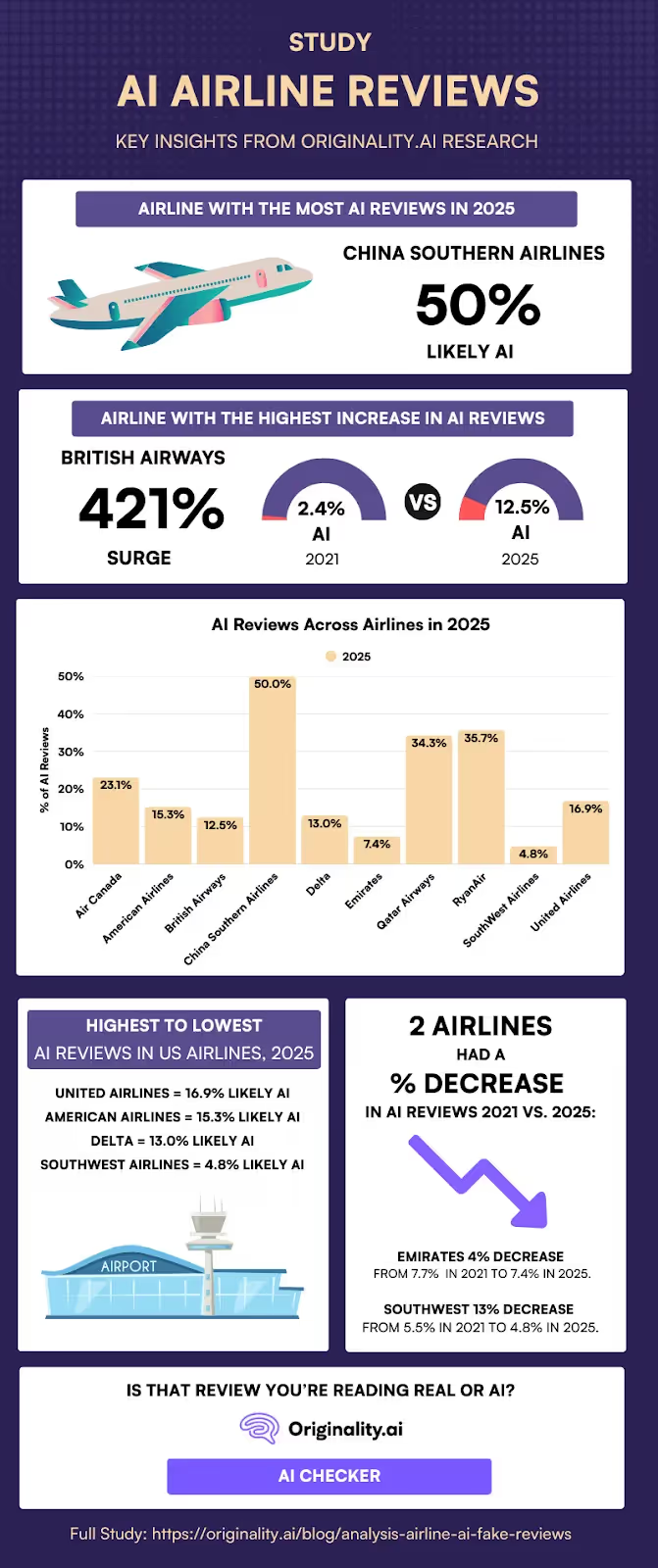
Originality.ai AI detector
Airline reviews play a key role in shaping consumer choices. However, with AI tools capable of generating realistic reviews, the line between authentic and artificially created feedback has blurred.
In just a matter of clicks, an experienced prompter can get a list of reviews generated, each with a unique (enough) tone and style to come across as a different “customer.”
John Gillham, CEO at Originality.ai, explains why humans struggle to spot AI content:
“Despite confidence in their own ability, humans tend to struggle to spot AI-generated content. A study revealed that experienced teachers only accurately identified 37.8% of AI texts. Which is why AI content detectors are so important. They’re significantly more effective than humans at identifying AI content
“There are some significant implications of not being able to detect AI content, such as the spread of misinformation, academic dishonesty, and a lack of authenticity online.”
This has raised questions about the reliability of reviews on platforms like AirlineQuality, TripAdvisor, Google Reviews, and airline-specific portals. Airlines and consumers alike must now consider whether AI content is influencing perceptions of service quality and trustworthiness.
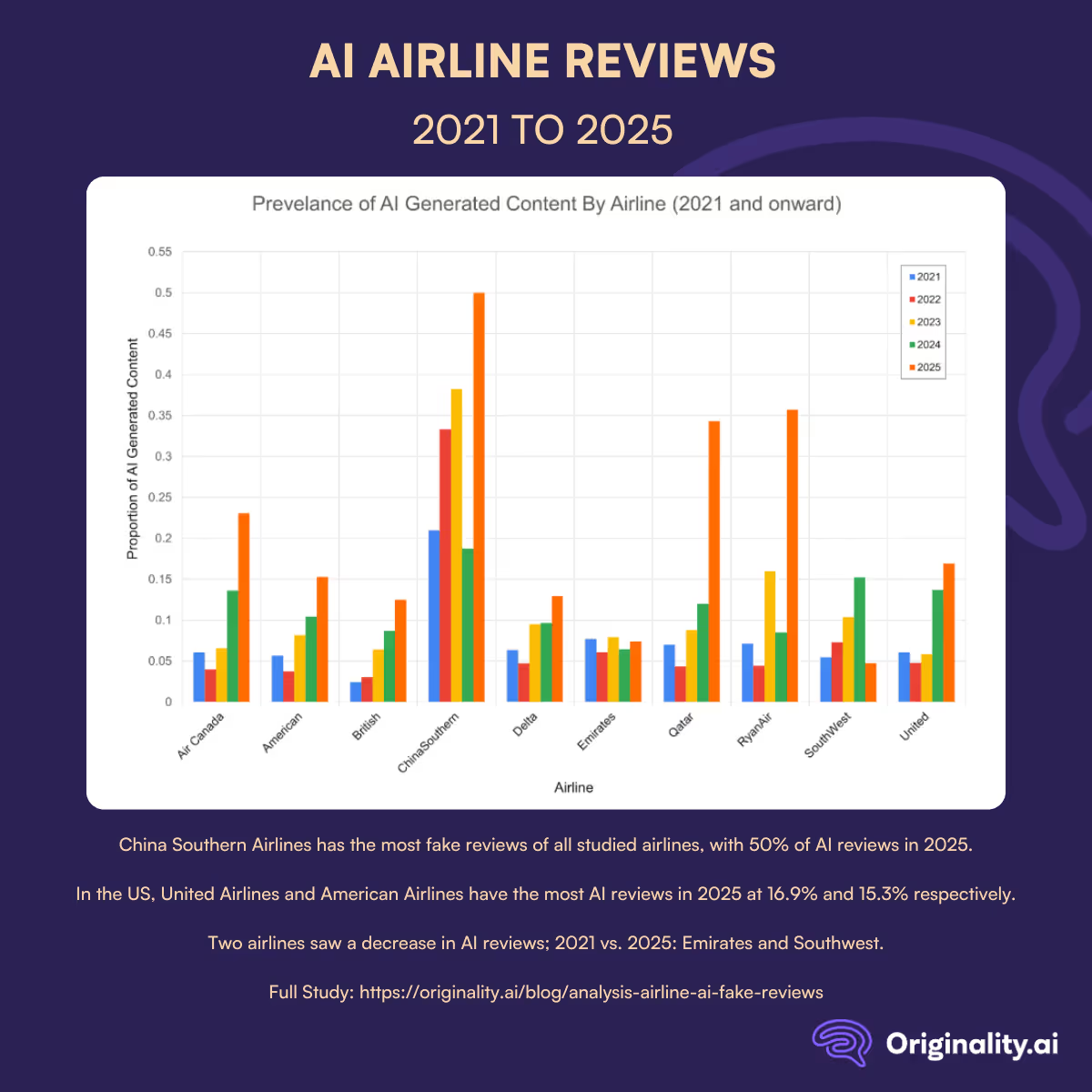
Our study analyzed the reviews of 10 airline carriers from around the world by looking at reviews from SkyTrax, a well-known platform where travellers leave reviews of their airline experiences. We then analyzed the reviews in our Originality.ai AI detector to find out if the reviews were AI-generated or human-written
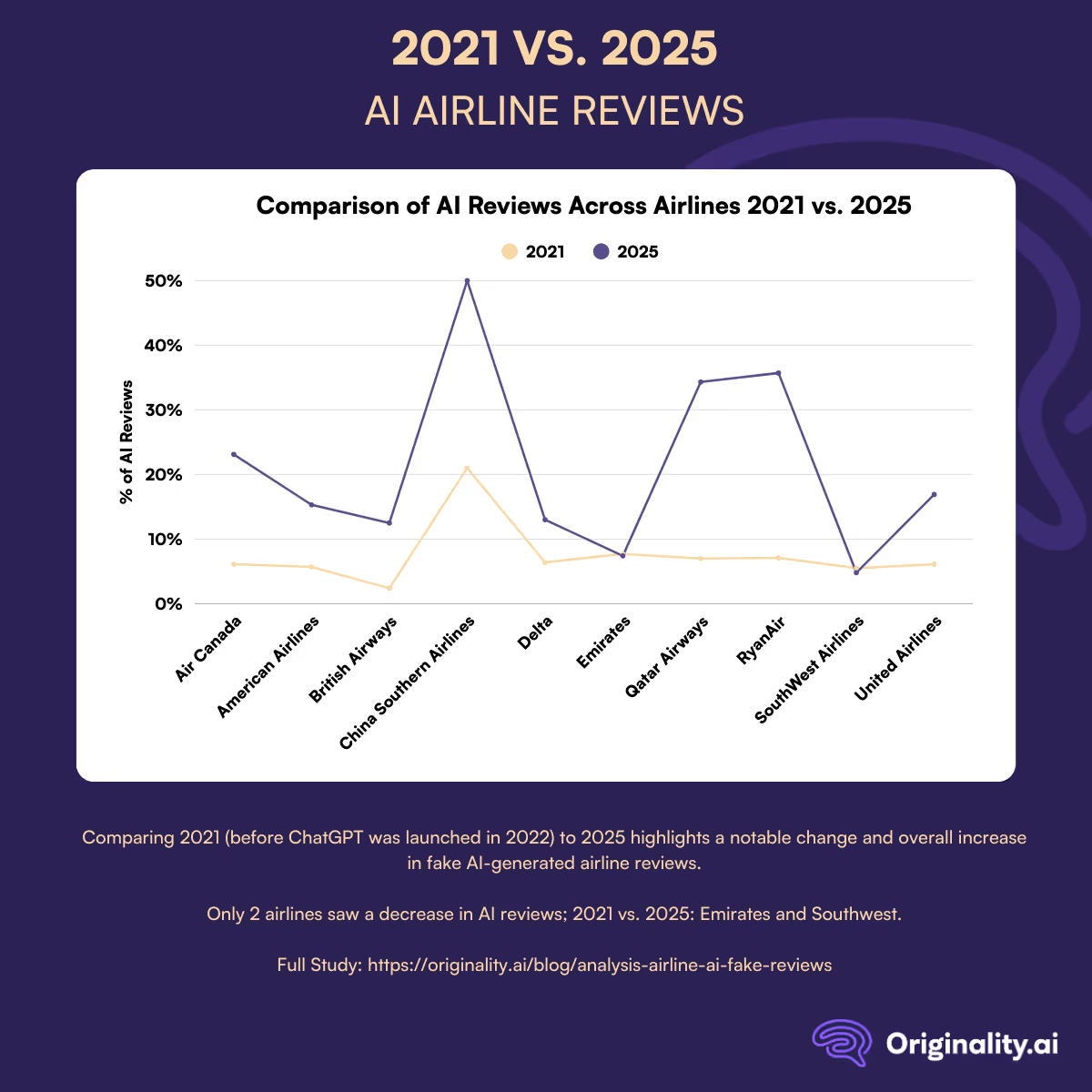
Comparing 2021 (before ChatGPT was launched in 2022) to 2025 highlights a notable change and overall increase in fake AI-generated airline reviews.
Let’s take a closer look:
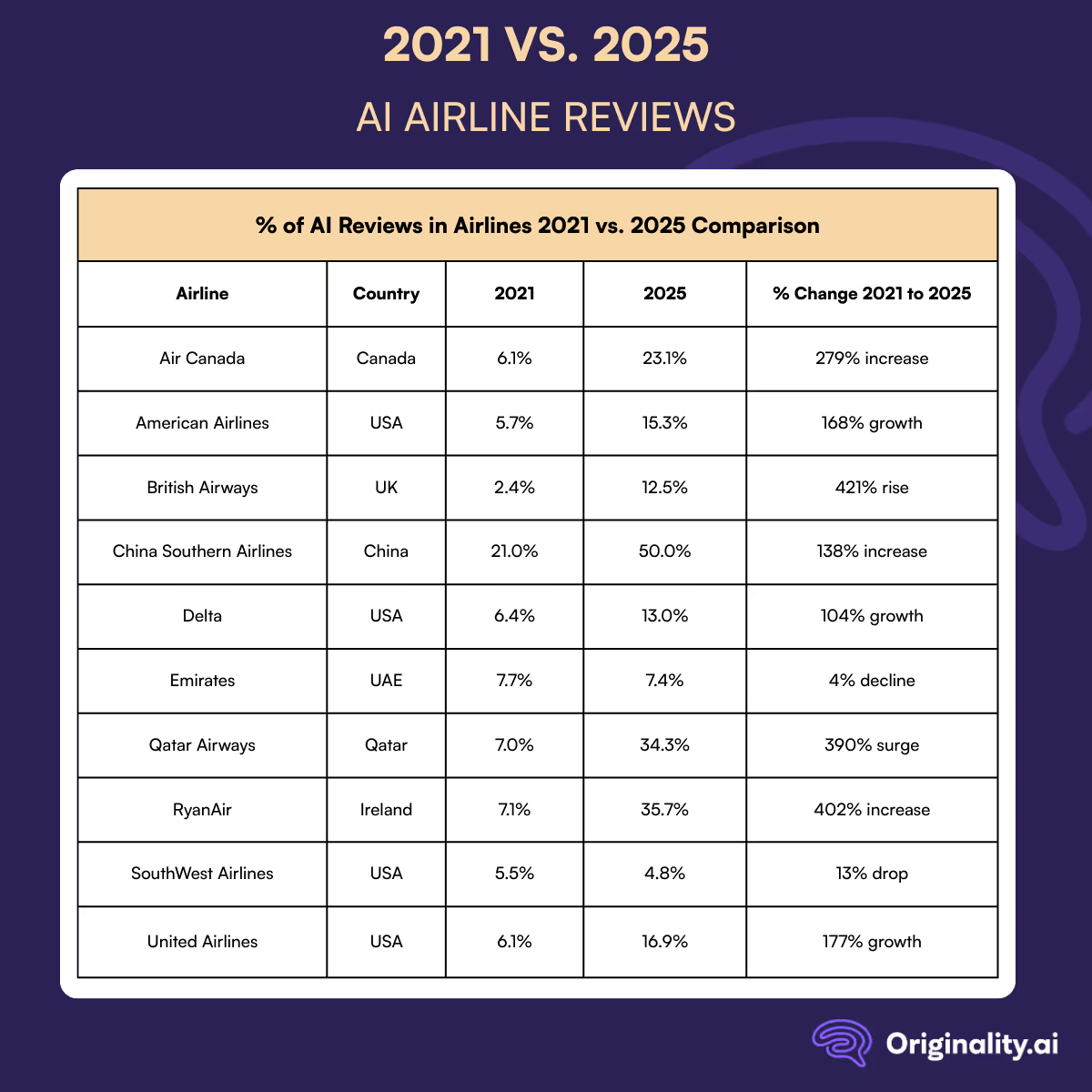
In our study, we analyzed specific airlines from all over the world to find out which ones have the most fake reviews and are potentially misleading customers.
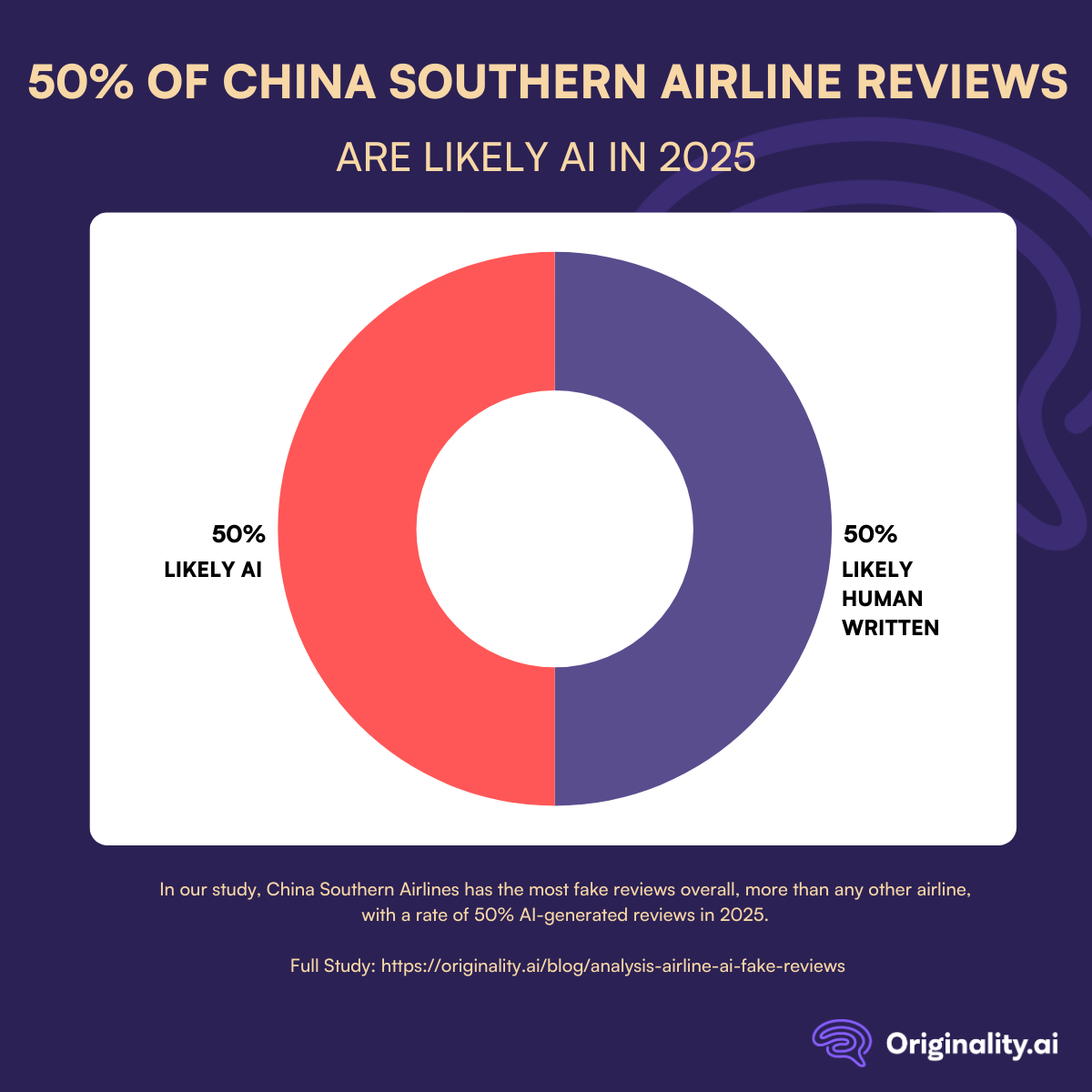
In our study, China Southern has the most fake reviews overall, more than any other airline, with a rate of 50% AI-generated reviews in 2025.
This shows that consumers who are trusting the reviews and potentially looking to buy a ticket from the airline are not informed enough to make a trusted decision.
China Southern has a 3.5 star average rating on TripAdvisor.
In 2025, United Airlines recorded an AI-generated review rate of 16.9%, marking it as the U.S. airline with the highest percentage of reviews generated by artificial intelligence.
Meanwhile, American Airlines saw a significant surge in fake reviews over the past year, with 15.3% of its reviews being AI-generated as of 2025.
The high prevalence of AI reviews of United Airlines and American Airlines highlights potential challenges in managing their online reputation and ensuring that reviews reflect genuine customer experiences.
Comparatively (highest to lowest) levels of AI reviews in US-based airlines, as of 2025:
The significant presence of AI-generated reviews across airlines may prompt the industry to adopt more stringent verification measures, as travellers increasingly rely on online reviews when making booking decisions.
Interestingly, Emirates and Southwest both saw a drop in AI-generated content in their reviews (when comparing 2021 vs. 2025), which could suggest that both companies have decided to tackle the issue and implement measures to moderate AI content.
From 2021 to 2025:
Emirates and Southwest were the only two airlines to see a decline in reviews; AI reviews increased for the rest of the airlines studied.
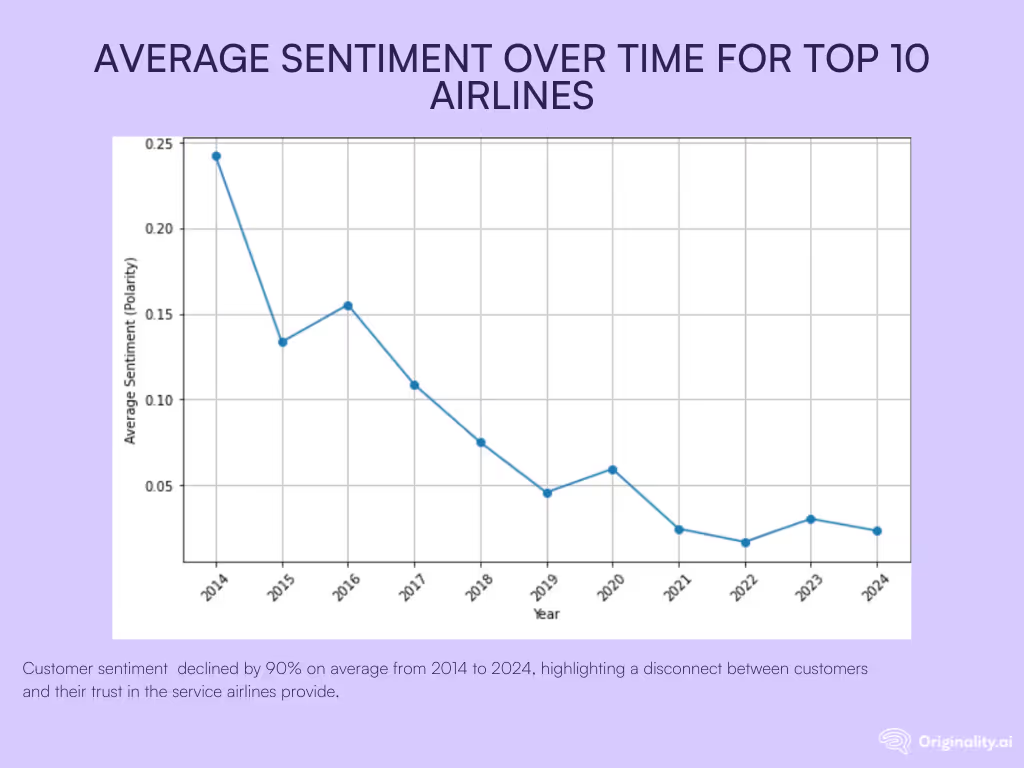
Next, let’s take a look at the impact that AI-generated reviews may have had on customer sentiment in the airline industry.
For this segment of the study, we analyzed customer sentiment from 2014 to 2024:
The sentiment graph above shows that across our major airlines, customer sentiment has seen a major decline by 90% from 2014-2024.
Below, we provide a visual representation of the average customer sentiment over time, allowing for an analysis of trends and fluctuations in customer feedback.
The blue data points represent individual days' median sentiment scores, with each point indicating the collective sentiment of reviews made on that day.
The green dashed line represents the Lowess smoothed line, which smooths out short-term variations and highlights longer-term trends. By comparing the individual data points with the smoothed line, you can identify both immediate shifts in sentiment as well as general patterns that might emerge over time.
When interpreting the sentiment graphs, a positive sentiment score (above zero) suggests generally favorable reviews, while a negative sentiment score (below zero) indicates dissatisfaction or negative feedback.
Sharp drops in sentiment might correspond to specific events (such as poor service incidents or flight cancellations), while more gradual changes could reflect broader shifts in customer perceptions over time.
If the green smoothed line shows a steady upward or downward trend, this indicates a sustained improvement or decline in customer satisfaction.
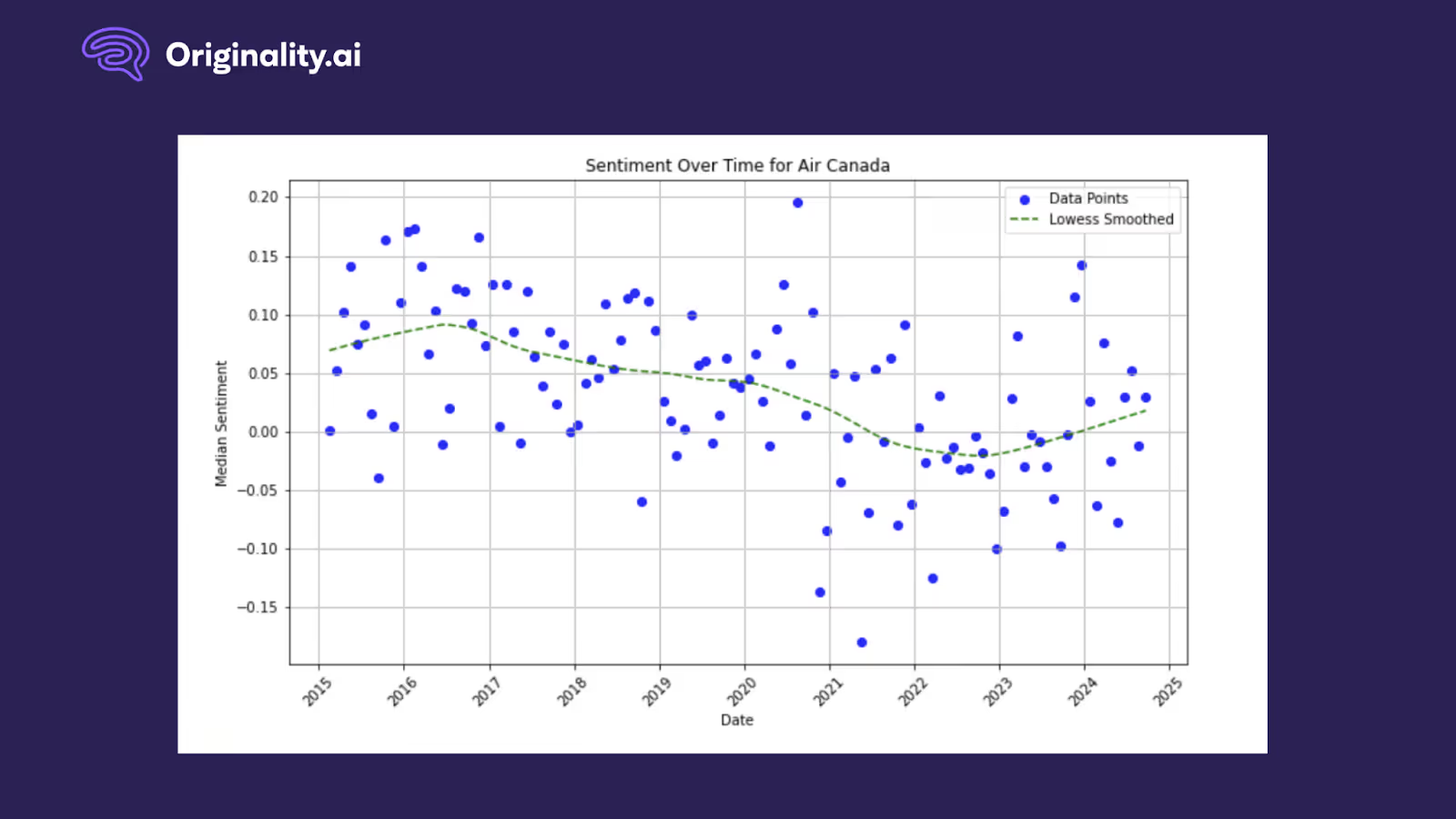
Looking closer at Air Canada, it’s easy to see a correlation between the increase in AI-generated reviews (6.1% in 2021 to 23.1% in 2025) and a general drop in customer sentiment.
Of course, other factors may have also influenced this, most notably the knock-on effects of COVID, but it is obvious from the data that more AI-generated reviews do not align with more positive experiences.
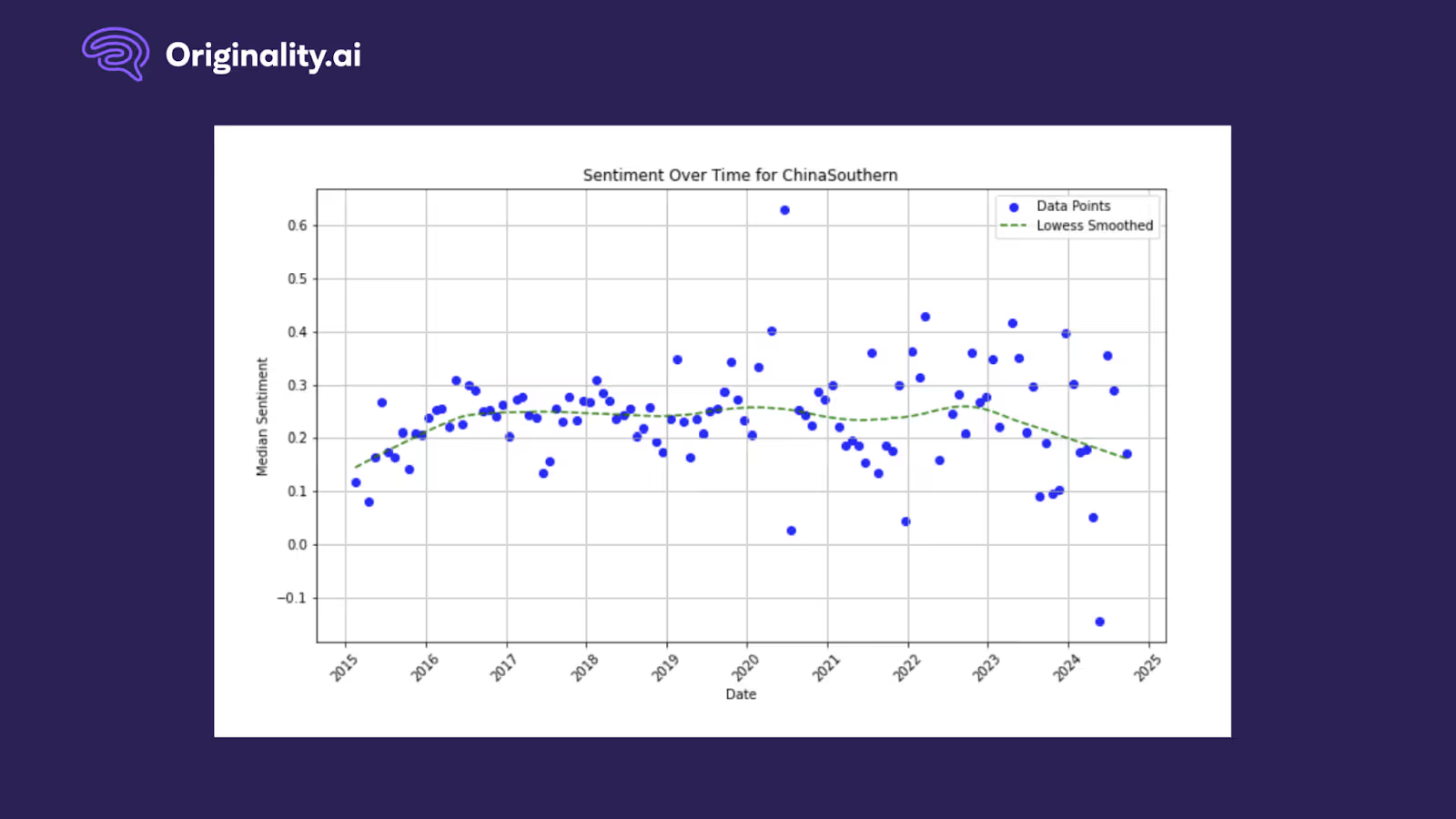
This situation is also similar for China Southern Airlines, with a notable increase in AI reviews from 2021 to 2025 (21.0% in 2021 to 50.0% in 2025). While average customer sentiment only began to drop off in 2023, the range of sentiment drastically increased, with customers seemingly either loving or hating their experience with the brand.
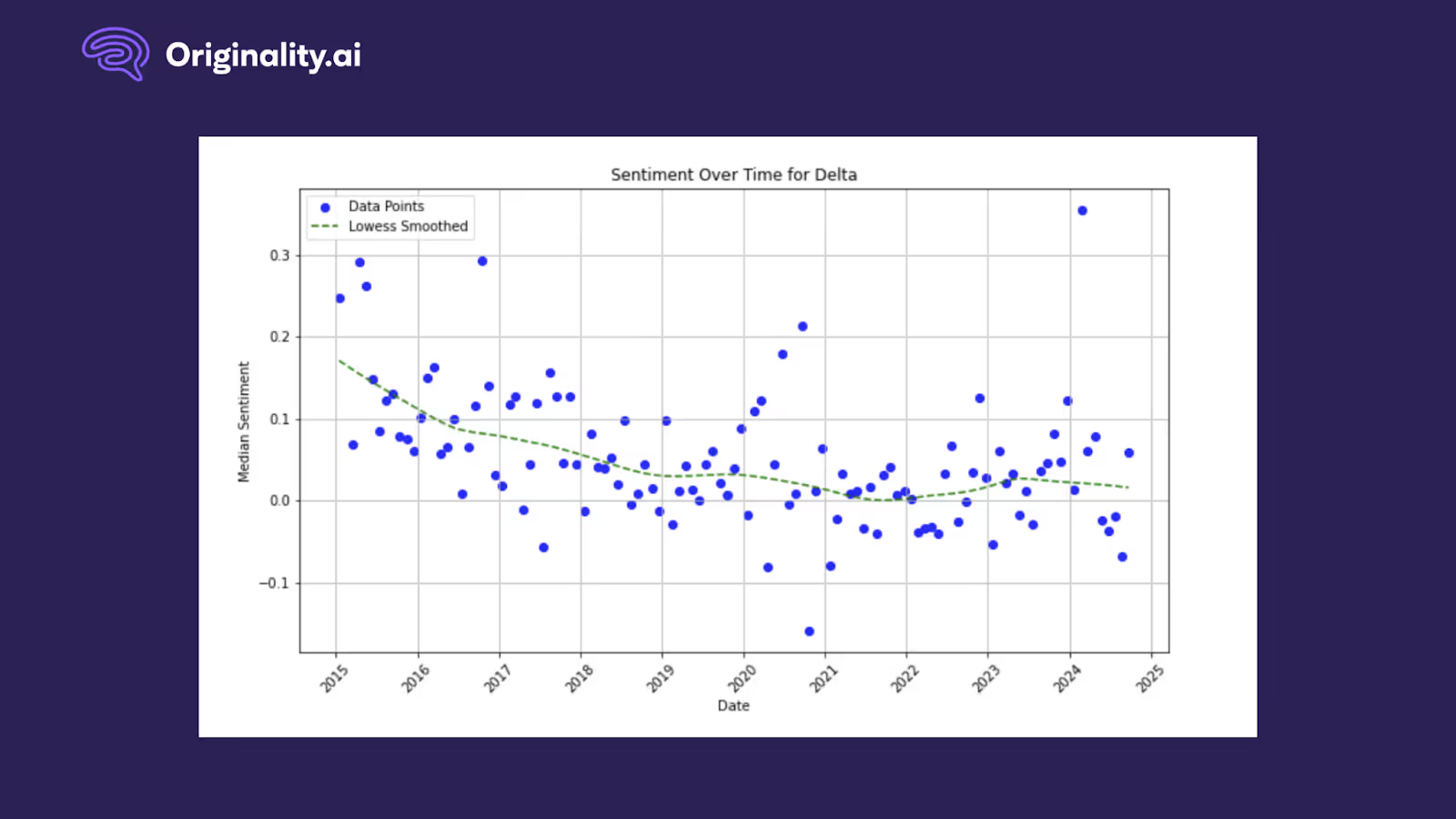
The correlation between increased AI-generated reviews and declining customer sentiment is much clearer for Delta. Once one of the most popular airlines in America, Delta's AI-generated reviews rose from 6.4% in 2021 to 13.0% in 2025, a 104% growth in total. At the same time, customer sentiment continued to drop from the highs of 2015 to the current lows of 2025.
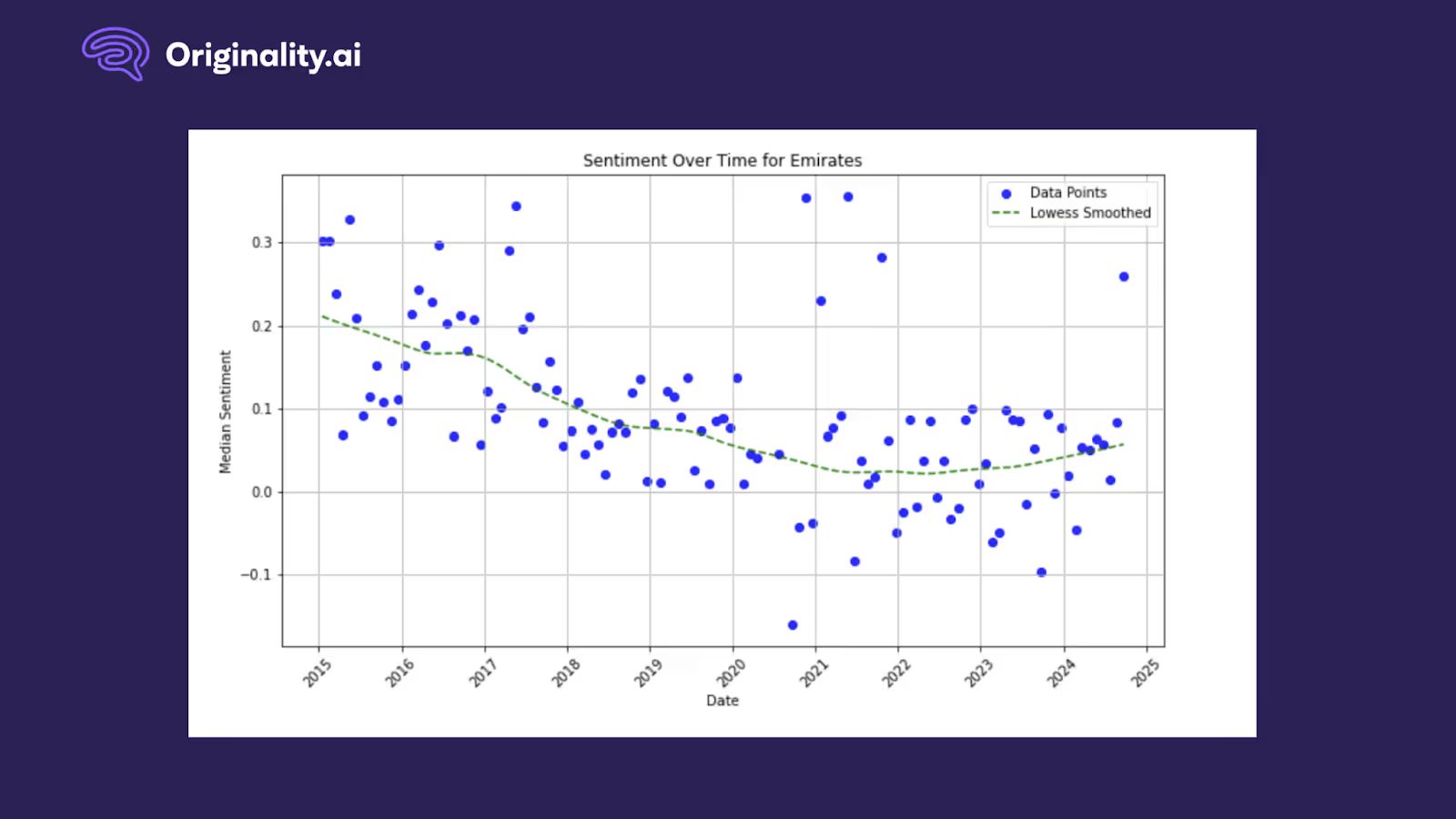
Interestingly, Emirates went from having 7.7% AI reviews in 2021 to 7.4% in 2025 and was one of two airlines which demonstrated a decrease in AI reviews in 2025.
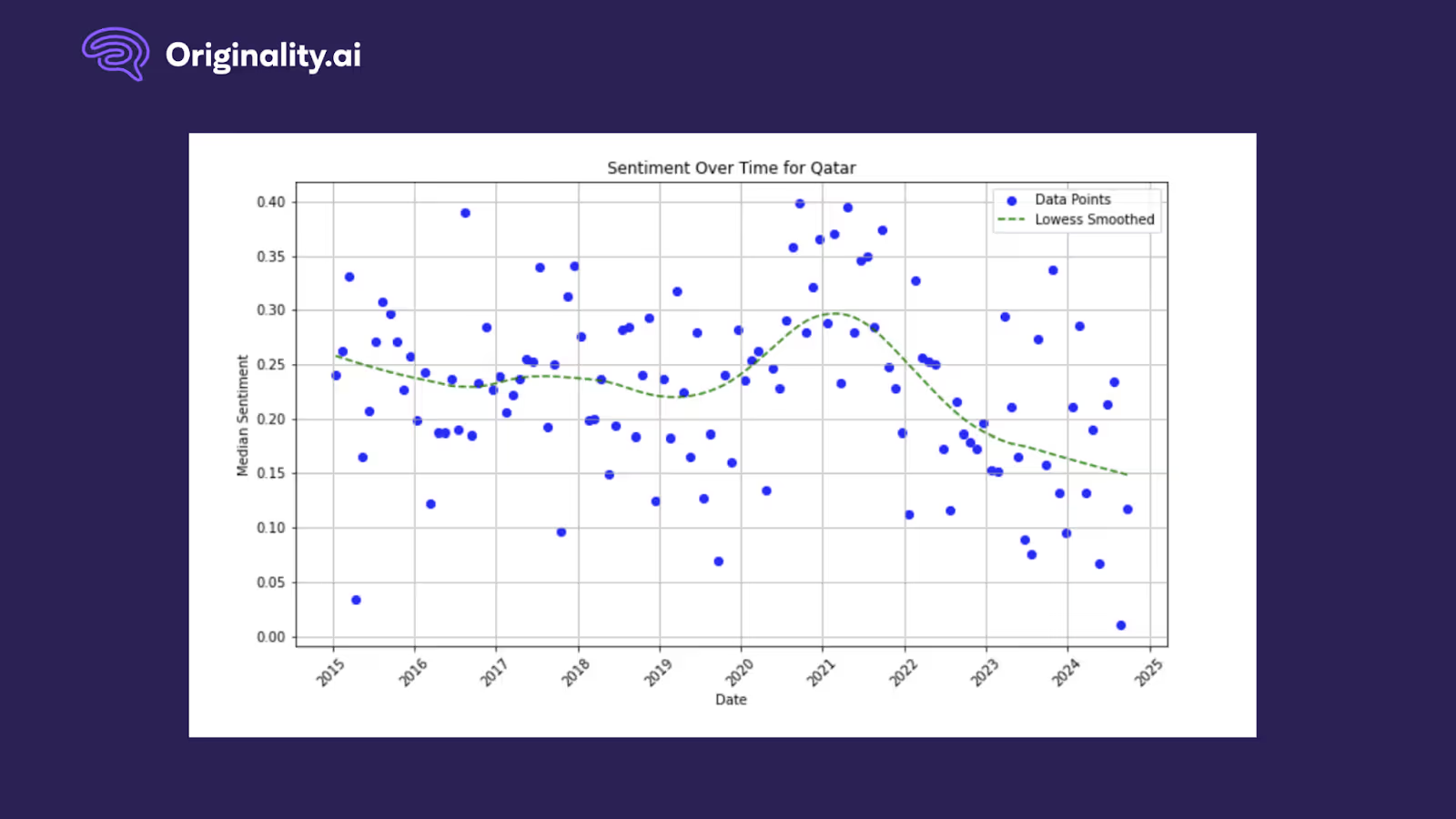
Qatar Airways increased AI-generated reviews from 7.0% in 2021 to 34.3% in 2025. At that same time, customer sentiment dropped from the highs of 0.30 to 0.15.
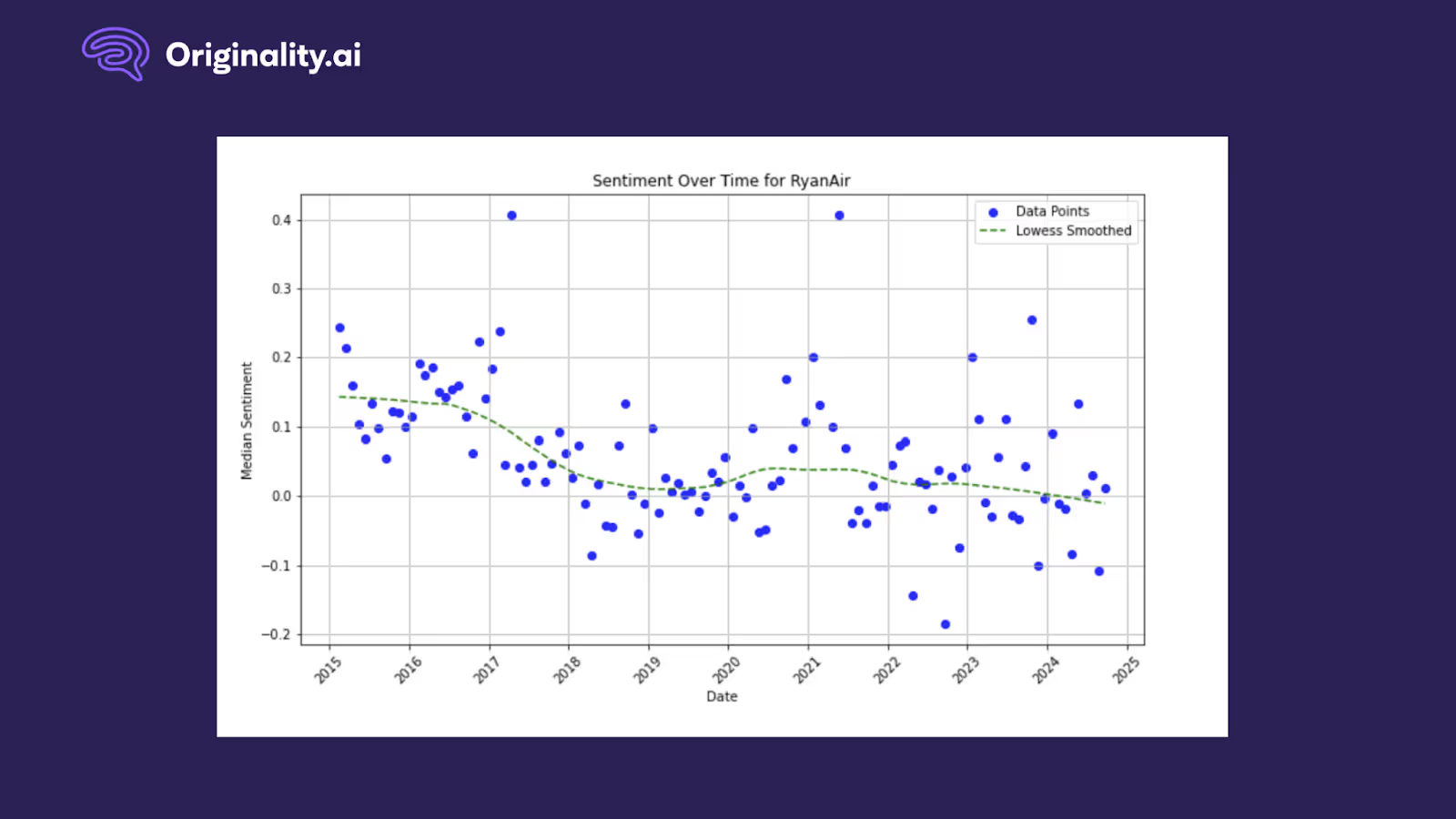
Although RyanAir has never been the most popular of airlines, it is interesting to see that their popularity has waned in the past decade, with some significantly poor customer sentiment scores in 2022/23. This timeframe also coincided with a climbing percentage of AI reviews 7.1% in 2021 to 35.7% in 2025.
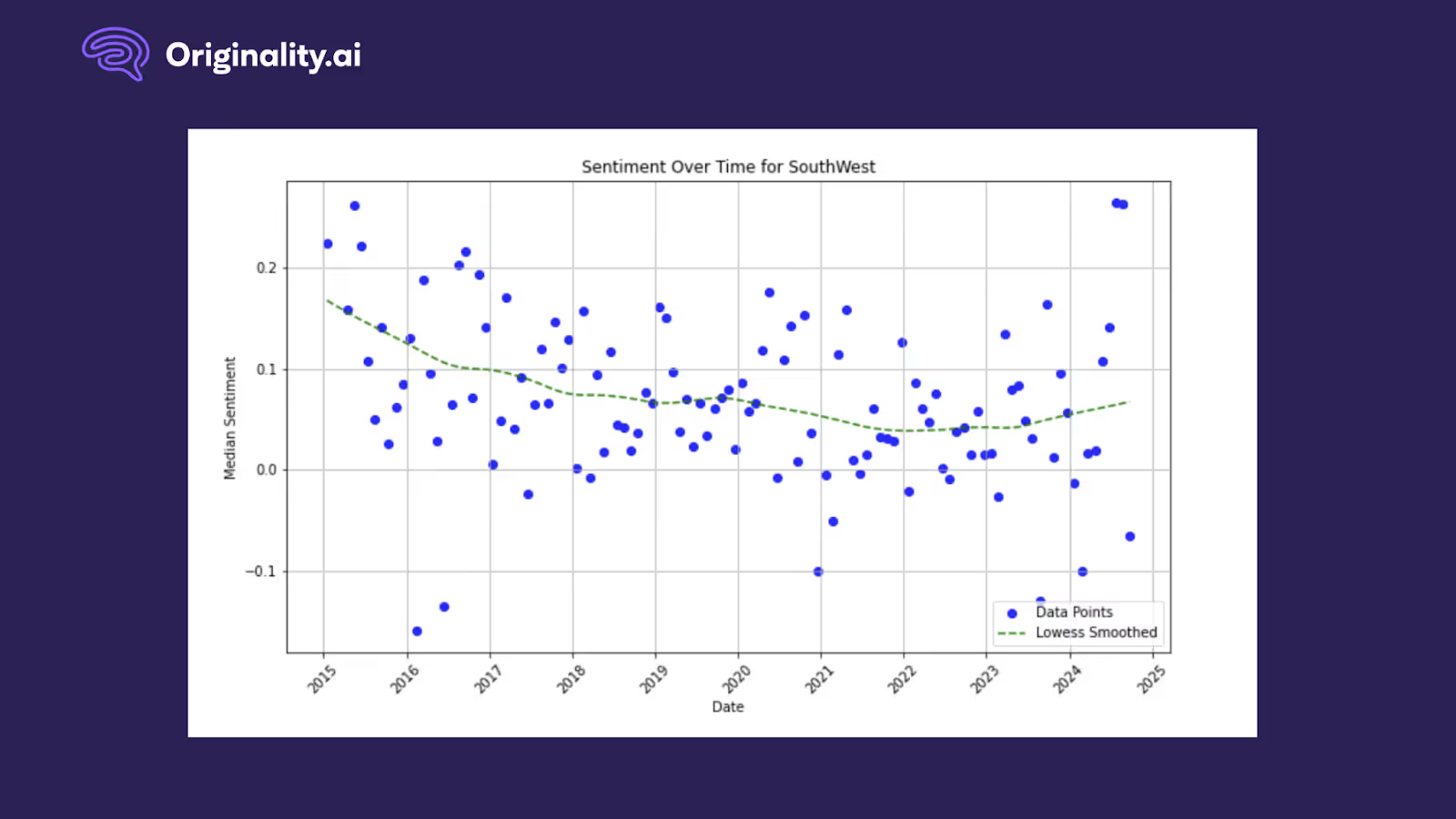
Southwest Airlines was one of the two airlines, along with Emirates, which showed a decline in AI-generated reviews, from 5.5% in 2021 to 4.8% in 2025.
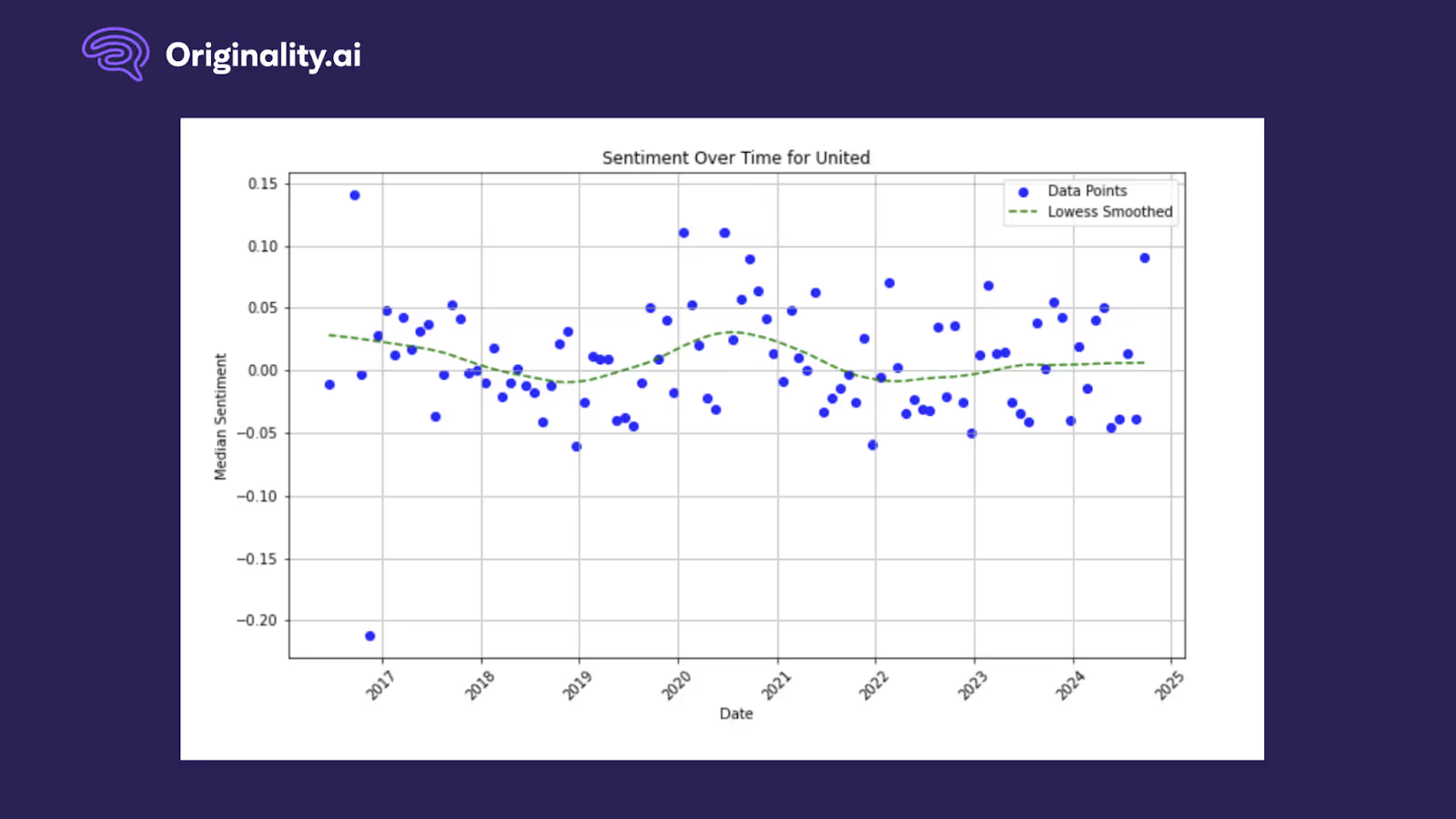
United Airlines had an overall low customer sentiment from this study, and also showed a significant rise in AI-generated content, increasing from 6.1% in 2021 to 16.9% in 2025, without any major impact on the customer sentiment scores.
Spotting AI-generated reviews can be a minefield, especially as LLMs are becoming much better at mimicking human content online. In fact, multiple studies have shown that even humans who think they can detect AI content find it difficult to do so.
Jon Gillham, CEO of Originality.ai has laid out his top tips for spotting AI-generated reviews so consumers can make better choices online:
Overall, from 2021 to 2025, there was a notable increase in AI airline reviews (with the exception of two airlines — Southwest and Emirates, which had a decline in AI reviews).
Further, sentiment analysis revealed that overall, customer review sentiment has declined by 90%. This may be related to factors such as an increase in AI-generated reviews, as well as changes that have impacted the travel and tourism industry since the COVID-19 pandemic.
A lack of authenticity and transparency in customer reviews raises questions and concerns about the reliability and trustworthiness of airline reviews.
One of the biggest influencers in airline choice (other than price) is brand loyalty, and rising AI-generated reviews could ultimately lead to some major brands losing their current market share.
To be sure that everything you are reading online is legitimate and human-written, be sure to check out the Originality.ai AI Detector.
Read more about the impact of AI across industries:
How We Conducted the Study:
We used Originality.ai's API to detect AI-generated airline reviews by analyzing their content. Reviews with at least 50 words were scanned for an AI likelihood score and classified as AI-generated or not. We focused on the top 10 airlines by brand value, and visualized how AI-generated reviews changed over time, marking major AI model releases.
Sentiment Analysis:
We collected reviews from airlinequality.com, cleaned the data, and analyzed customer sentiment over time using TextBlob. Lowess smoothing helped highlight trends in customer satisfaction, with visualizations showing daily sentiment scores and overall trends. These insights are useful for tracking airline performance and satisfaction.
Crunchbase sources for airline location data:
For raw data contact maddie@originality.ai

MoltBook may be making waves in the media… but these viral agent posts are highly concerning. Originality.ai’s study with our proprietary fact-checking software found that Moltbook produces 3 X more harmful factual errors than Reddit.